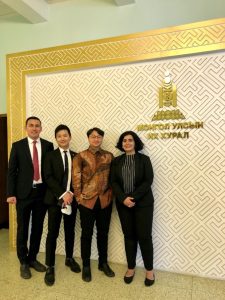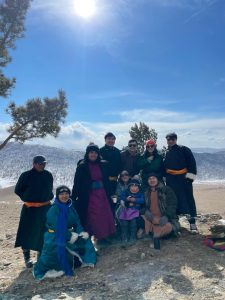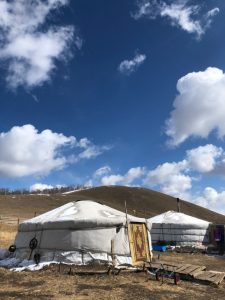Capstones and Workshops: Addressing Real-World Challenges While At SIPA
One of the best things about SIPA is that you can do a project with external clients in the areas that most interest you. You can choose to do either a Capstone Workshop or a Capstone Workshop in Sustainable Development Practice. A Capstone Workshop is a live consulting project with an external client outside of SIPA, with the goal is to provide clients with innovative analysis and practical recommendations.
Whether you are interested in addressing education challenges in developing countries, or evaluating impact investment in South-East Asia, there is a choice for everyone! I spoke with Ivan Mahardika about his experience conducting a Workshop project with the Prime Minister’s Office of Mongolia. Read on to get this insight on the Capstone experience!
Hello! My name is Ivan Mahardika, hailing from Jakarta, Indonesia. I am studying Masters of Public Administration, concentrating in Economic and Political Development and specializing in Data Analytics and Quantitative Analysis. I am on my 2nd year of graduate school, and as a final year’s EPD concentrator, I am currently doing Capstone Workshop on Sustainable Development Practice (or Workshop in short).
What is your workshop about?
I am doing a workshop about strengthening government institution in Mongolia. The workshop objective is to design a global standard Delivery Unit for Prime Minister’s Office of Mongolia. Delivery Unit is a task force, commonly within an executive power of central government, that promote more effective implementation of programs and delivery of results to citizens. The SIPA team’s role is to provide research assistance to help design key elements of a Delivery Unit by studying experience of other countries, glean good practices, and co-develop a strategic operating plan and related tools for the Delivery Unit with the client.
Who is your client?
Our client is the Prime Minister’s Office of Mongolia, specifically the Prime Minister’s Delivery Unit. What is unique about this workshop is that our exercise is parallel to the launching a Delivery Unit, meaning the progress to setup this unit are ongoing by the Government of Mongolia. When our team first received the documentation on the project in late Fall, the idea of having this unit was still being explored. By the start of Spring semester, the unit has been established and in the process of launching. Therefore, we closely coordinate with the client to ensure that our work is relevant, timely, and valuable.
You were able to travel for the project. Can you tell us more about that? Where did you go, what did you do?
Our team travelled to Ulaan Baatar, Mongolia over the Spring break. Since the beginning of the project, we always stress the importance of having in-person interaction with the client and relevant stakeholders in Mongolia governance. We’d like to ensure that we give informed and sensible advisories to the client. Being physically in Mongolia enables the team to capture the ongoing conversation as well as the nuance of intragovernmental coordination in Mongolia, which is essentially the core of the project. For the trip, we identified relevant stakeholders and tailored questions that we are interested in exploring with them. By the end of the trip, we were able to interview more than 10 stakeholders including government officials from various ministries and representatives from multilateral organizations. Our client also helped us arranged interviews with stakeholders that are normally difficult to have a meeting with given their tight schedule, such as high-ranking officials from ministries.

The dream team posing in front of Official Backdrop of Mongolian Government Palace. Only 4 out of 6 of us were able to travel.
What was the best part of the trip? Any lessons?
There are two things. First, the opportunity to understand Mongolia’s contemporary politics and policy making context from first-hand. Being able to travel to Mongolia is already a privilege, let alone having in-person conversation with policymakers about policy formulation in Mongolia. I find it interesting that Mongolia’s development strategy and opportunities subtly remind me of the situation faced by my home country (and perhaps other emerging economies) with its own challenges. This comparative analysis is where our team could contribute the most and turns out what is needed by the client, providing our prior experience and background. This leads to the second point, that is my workshop team. My team is arguably one of the most diverse Workshop teams: we come from different nationalities (Indonesian, Brazilian, Indian, Kazakhstan, Korean-American, and Tajikistan-American) as well as professional background, namely international development researchers, military service, civil servant, and corporate strategy consultant. I appreciate the fact that we bring our experience and expertise to the table and able to complement each other. During the trip, we worked effectively as a team and managed to deliver client’s expectation.
Any fun experiences while visiting?
There are tons! On our second day, we were able to go on a tour of the government palace, which is home to many Mongolian historical artifacts. One interesting corner was the hallway with Mongolia head of states’ photographs hanged on the wall, where some of the pictures are only available in painting due to the history of communism in Mongolia. On our (one and only) day-off, we visited one of our client’s family who is adopting Mongolian nomadic lifestyle. We travelled to the countryside, Batsümber in Töv province, halfway to Russia’s Siberia. They welcomed us in their Ger (traditional Mongolian hut) with typical Mongolian food (a lot of meats!) and beverages. We went on a little hike to the hill behind their home and enjoyed homemade Glühwein. Despite not being able to communicate in Mongolian and the fact that it was -15°C, we could definitely feel the warmth of Mongolian’s hospitality.
Do you have any advice for students wanting to do a capstone / workshop?
I would advise to choose project with topic that resonates with your interest and offers you a learning curve to prepare for the job market. In my case, I always know I’m interested in the topics of governance reform and strengthening institutional capacity for policymakers. I also know that I want to expand my knowledge and experience working in other emerging economies settings. This project definitely crossed off the two criteria I looked for in a Workshop.

Hiking after an intense yet productive spring break

Mongolian Ger and scenery
Any final thoughts?
Working on a Workshop project is one of the highlights of my graduate school experience. It is an opportunity to creatively apply what I have learned conceptually in class and combine it with professional experience I had prior to SIPA. I have been lucky not only that I work on an interesting project and supportive teammate, but also to be able to travel amidst of health restrictions. I will always carry this experience in my career and be confident to say, “Hey, as a graduate student, I have supported the Government of Mongolia!”